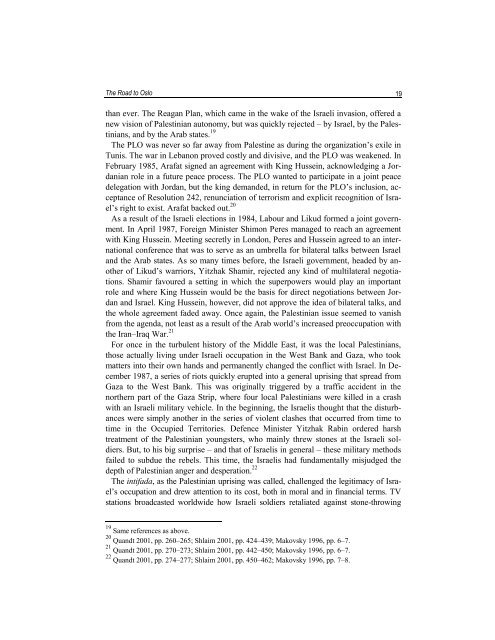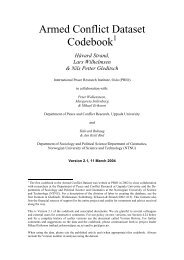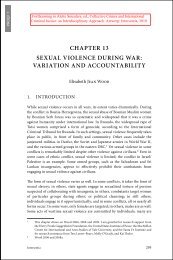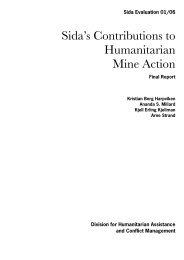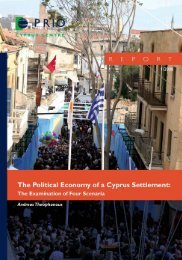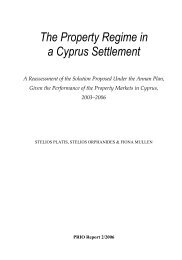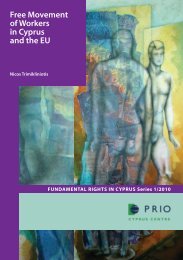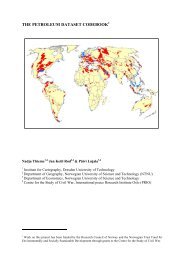Peacemaking Is a Risky Business - PRIO
Peacemaking Is a Risky Business - PRIO
Peacemaking Is a Risky Business - PRIO
Create successful ePaper yourself
Turn your PDF publications into a flip-book with our unique Google optimized e-Paper software.
The Road to Oslo19than ever. The Reagan Plan, which came in the wake of the <strong>Is</strong>raeli invasion, offered anew vision of Palestinian autonomy, but was quickly rejected – by <strong>Is</strong>rael, by the Palestinians,and by the Arab states. 19The PLO was never so far away from Palestine as during the organization’s exile inTunis. The war in Lebanon proved costly and divisive, and the PLO was weakened. InFebruary 1985, Arafat signed an agreement with King Hussein, acknowledging a Jordanianrole in a future peace process. The PLO wanted to participate in a joint peacedelegation with Jordan, but the king demanded, in return for the PLO’s inclusion, acceptanceof Resolution 242, renunciation of terrorism and explicit recognition of <strong>Is</strong>rael’sright to exist. Arafat backed out. 20As a result of the <strong>Is</strong>raeli elections in 1984, Labour and Likud formed a joint government.In April 1987, Foreign Minister Shimon Peres managed to reach an agreementwith King Hussein. Meeting secretly in London, Peres and Hussein agreed to an internationalconference that was to serve as an umbrella for bilateral talks between <strong>Is</strong>raeland the Arab states. As so many times before, the <strong>Is</strong>raeli government, headed by anotherof Likud’s warriors, Yitzhak Shamir, rejected any kind of multilateral negotiations.Shamir favoured a setting in which the superpowers would play an importantrole and where King Hussein would be the basis for direct negotiations between Jordanand <strong>Is</strong>rael. King Hussein, however, did not approve the idea of bilateral talks, andthe whole agreement faded away. Once again, the Palestinian issue seemed to vanishfrom the agenda, not least as a result of the Arab world’s increased preoccupation withthe Iran–Iraq War. 21For once in the turbulent history of the Middle East, it was the local Palestinians,those actually living under <strong>Is</strong>raeli occupation in the West Bank and Gaza, who tookmatters into their own hands and permanently changed the conflict with <strong>Is</strong>rael. In December1987, a series of riots quickly erupted into a general uprising that spread fromGaza to the West Bank. This was originally triggered by a traffic accident in thenorthern part of the Gaza Strip, where four local Palestinians were killed in a crashwith an <strong>Is</strong>raeli military vehicle. In the beginning, the <strong>Is</strong>raelis thought that the disturbanceswere simply another in the series of violent clashes that occurred from time totime in the Occupied Territories. Defence Minister Yitzhak Rabin ordered harshtreatment of the Palestinian youngsters, who mainly threw stones at the <strong>Is</strong>raeli soldiers.But, to his big surprise – and that of <strong>Is</strong>raelis in general – these military methodsfailed to subdue the rebels. This time, the <strong>Is</strong>raelis had fundamentally misjudged thedepth of Palestinian anger and desperation. 22The intifada, as the Palestinian uprising was called, challenged the legitimacy of <strong>Is</strong>rael’soccupation and drew attention to its cost, both in moral and in financial terms. TVstations broadcasted worldwide how <strong>Is</strong>raeli soldiers retaliated against stone-throwing19 Same references as above.20 Quandt 2001, pp. 260–265; Shlaim 2001, pp. 424–439; Makovsky 1996, pp. 6–7.21 Quandt 2001, pp. 270–273; Shlaim 2001, pp. 442–450; Makovsky 1996, pp. 6–7.22 Quandt 2001, pp. 274–277; Shlaim 2001, pp. 450–462; Makovsky 1996, pp. 7–8.


